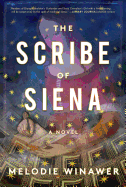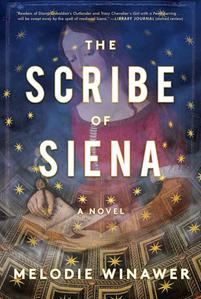
 Neurosurgeon Beatrice Trovato has always been a deeply empathetic person. But when she begins having sudden, deeply emotional reactions while performing surgery, she worries that her new sensitivity will interfere with her job. As she plans a long-overdue vacation to visit her brother Ben in Italy, she receives news of his unexpected death. As the sole beneficiary of his estate, Beatrice boards her flight to Siena, saddened but eager to explore the city Ben loved. Her story unfolds in two widely separated time periods--and with rich detail--in Melodie Winawer's debut novel, The Scribe of Siena.
Neurosurgeon Beatrice Trovato has always been a deeply empathetic person. But when she begins having sudden, deeply emotional reactions while performing surgery, she worries that her new sensitivity will interfere with her job. As she plans a long-overdue vacation to visit her brother Ben in Italy, she receives news of his unexpected death. As the sole beneficiary of his estate, Beatrice boards her flight to Siena, saddened but eager to explore the city Ben loved. Her story unfolds in two widely separated time periods--and with rich detail--in Melodie Winawer's debut novel, The Scribe of Siena.
Arriving in Siena (a place she has never been), Beatrice feels immediately and deeply at home. Grieving Ben's death but captivated by his city, she ensconces herself in Ben's house and begins digging into his scholarly research on Siena during the Plague. Before his death, Ben was edging closer to solving a centuries-old mystery: why Siena was hit harder by the Plague than other Italian cities and why it never recovered its former prominence. Delving into local archives (with the help of a kind librarian), Beatrice discovers the journal of a medieval artist, Gabriele Beltrano Accorsi, who painted several frescoes on the facade of Siena's Duomo. Slipping into the church one day, Beatrice is abruptly transported to 14th-century Siena--months away from the advent of the Plague, and soon is face to face with Accorsi himself.
Readers will admire Beatrice's presence of mind as she struggles to adjust to an entirely new context, posing as a grieving widow and finding employment as a scribe. She builds a few cherished friendships and even falls in love with Gabriele, the painter--but she misses her own century, and has no idea how to return there. Meanwhile, a vicious conspiracy by Florentine and Sienese noblemen (including relatives of the Medici family) threatens to wipe out Siena completely--putting both Beatrice and Gabriele in danger. Racing against time in more ways than one, Beatrice tries to identify the culprits while wondering if she can ever return to her own time, or if she wants to.
Winawer renders her story in compelling detail, in Beatrice's whip-smart, observant, often sarcastic voice. Supporting characters in both eras--Ben's neighbor Donata in the present day; the sharp-eyed nun Suor Umiltá in 1347; Gabriele and his family--are also vivid and endearing. The conspiracy is vital as a plot device, but the more resonant theme is Beatrice's deep love for both her centuries and her heartfelt struggle to decide where she belongs. --Katie Noah Gibson, blogger at Cakes, Tea and Dreams
Shelf Talker: A 21st-century neurosurgeon is transported to pre-Plague Italy in Melodie Winawer's vivid, compelling debut novel.

